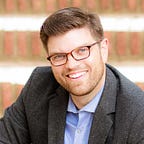Going to church is wrong
There are times when my wife and I look at each other on a certain night of the week with a feeling of anxiety and dread about the coming day. We know how much work it will bring, and we’re not really looking forward to it.
You would think I’m talking about the dread of beginning the work week on Monday morning, but I’m not. I’m talking about the Saturday night dread of Sunday morning — the day of rest.
You wouldn’t think that going to church would take so much energy. But I think my wife and I left going to church behind us a while back. We don’t go to church anymore, we participate in and contribute to a community. And on Sundays, our community gathers for worship. And we’re part of it.
A community is a living organism. It can grow, or it can shrivel. It can get stronger, or weaker. We can feed it, or let it starve.
American communities in the 18th and 19th centuries understood this far better than we do today. The need for community strength was a matter of survival. If the community didn’t pull together to build barns, the farmers’ livestock would likely die in a cold winter. Without livestock, the farmer might not be able to plow fields to plant grain. Without grain… you get it, right?
So they knew, when a farmer needed to build or repair a barn every family in the community was expected to show up. Able-bodied men labored over stone and wood. Children carried tools and supplies. Women prepared food. If they didn’t, they faced the possibility of censorship from the community. And being on the outside of community is death in a world where people depend on one another to survive.
As for my wife and me, we love our community. It’s been there for us when we needed it, and continues to be. So we want it to grow, and get stronger. And we know that it’s our responsibility to feed it. That means if there are places for us to use our talents and time, we have a responsibility to do so. We’re musicians — we play on the praise team. Jill is a teacher — she teaches kids on Sunday morning. I enjoy meetings and organization — I serve as a deacon on the church council.
There are Sundays when we have four or five different roles that people are counting on us to play. It’s taxing. It exhausts us, and we day-dream about quitting everything and going back to “going to church” on Sundays. But we’d be wrong to do that.
We’re part of a community, and living in community takes work. It should feel like work, and every once in a while it should exhaust you. If being part of your church community doesn’t feel like work to you, maybe you’re doing it wrong.
